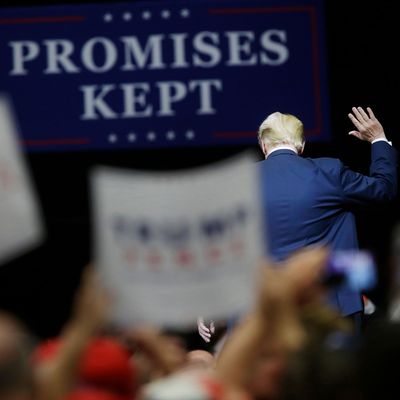
One of Donald Trump’s most well-received and attention-grabbing campaign promises was that he would allow the federal government to negotiate the price of prescription drugs it covers through Medicare. “If we negotiated the price of drugs, Joe, we’d save $300 billion a year,” he rather optimistically asserted. The reason this money-saving method had not been used, he told audiences, was the influence of the industry. “We don’t do it. Why? Because of the drug companies.” Liberals actually support the idea, which would allow the government to use its bargaining power to hold down prices, and which fed into Trump’s image as a populist outsider breaking with party orthodoxy. Trump claimed that other candidates were too compromised by their donors, but he had the financial independence to do the right thing. “We’re going to negotiate like crazy,” he said.
The “crazy” part of that promise has held up, but the “negotiate” part has not. Trump is announcing his Medicare prescription drug plan today, and Robert Pear reports it will not include the promised negotiations. “We are not calling for Medicare negotiation in the way that Democrats have called for,” an official says.
Donald Trump ran for president as an economic populist. This fact has been largely forgotten, buried by the flurry of bizarre and outrageous actions, and activists on both sides have had little reason to bring it up. Conservatives have pushed the administration to forget its unorthodox gestures and follow Paul Ryan’s lead. Progressives have emphasized the racist and sexist nature of Trump’s appeal. But Trump’s ability to distance himself from his party’s economic brand formed a decisive element of his appeal. Voters actually saw Trump as more moderate than any Republican presidential candidate since 1972. And he has violated every one of his promises.
This week, the administration announced very quietly there would be no infrastructure bill this year. Trump had forcefully positioned himself to Hillary Clinton’s left on this issue, promising to spend twice as much as she would, and painting lavish pictures of hard-hat jobs modernizing roads and airports across the country. Instead, he used all his fiscal running room on a large, regressive tax cut, which predictably has forced the deficit to a level where he no longer has political support for a deficit-financed infrastructure bill.
Trump promised over and over to pull out of Nafta and renegotiate a much better deal. Trump insisted Nafta was “at the center of the catastrophe” of declining blue-collar wages. He quoted Bernie Sanders’s attacks on Hillary Clinton as a free trader, and promised either to abrogate the treaty or to negotiate a much better deal as one of his first acts as president — “I don’t mean just a little bit better, I mean a lot better.” Unlike some of his other promises, this one was never terribly realistic — there is no easy “better” trade deal to be negotiated. Trump has instead tried to hide the ball by burying his policy in low-profile negotiations where he is requesting minor tweaks and hoping nobody notices.
Trump also repeatedly promised universal health care. Republicans as a whole had insisted since 2009 that they would replace Obamacare with something better, that did not deny anybody anything, but rather than fuzzing up this promise, like most of his party, Trump leaned heavily and explicitly into the benefits. “Everybody’s gotta be covered. This is an un-Republican thing for me to say … I am going to take care of everybody, I don’t care if it costs me votes or not. Everybody’s going to be taken care of, much better than they’re taken care of now … The government’s going to pay for it.” Instead, he never proposed an alternative to Obamacare, never compromised with Democrats on the issue, and instead sabotaged the existing program. After falling for several years, the uninsured rate is climbing again.
“Draining the swamp” has become a catchall-Republican slogan, like “lock her up,” that basically means doing anything to lash out at Trump’s opponents. During the campaign, though, it had a different and more specific definition. Trump promised to enact reforms to reduce the power of lobbyists and business. He specifically endorsed:
• A constitutional amendment imposing term limits on members of Congress
• A ban on federal employees lobbying the government for five years
• A ban on members of Congress lobbying for five years
• Tighter rules about what constitutes a lobbyist, instead of letting people call themselves consultants
• Campaign finance reform limiting what foreign companies can raise for American political candidates
• A ban on senior government officials lobbying for foreign governments
Trump has not merely forgotten these promises, his administration has embraced Washington sleaze with unprecedented gusto. Not only has he failed to prevent former administration officials from lobbying for foreign governments, he has had current administration officials lobbying for foreign governments. There has never been an American presidency so easily manipulated by domestic and foreign business interests. The most benign explanation for Michael Cohen’s secret payments to his hastily constructed Delaware shell company is that he was a conduit for business interests to buy their way into Trump’s good graces.
[Update] Trump also promised, over and over and over again, to raise taxes on the rich, including on himself. “It’s going to cost me a fortune, which is actually true,” he said. It was not actually true at all.
Trump promised to do a lot of un-Republican things to give resources and influence to blue-collar Americans, which would have threatened his party’s power brokers. Many of these promises were feasible if Trump actually wanted to follow through on them. Instead, the only promises he has kept are the ones that put money in the pockets of Trump and his cronies.






























